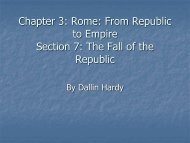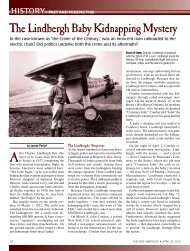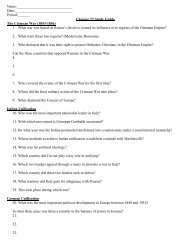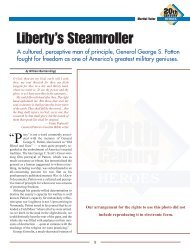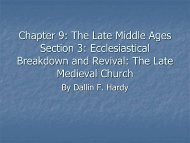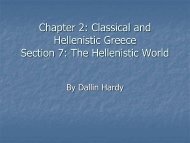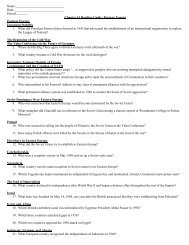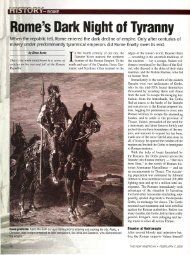Manifest Destiny
Manifest Destiny
Manifest Destiny
Create successful ePaper yourself
Turn your PDF publications into a flip-book with our unique Google optimized e-Paper software.
J<br />
on our part the pacific one."<br />
As a matter of fact the U.S. had long<br />
been willing to accept the 49th parallel, but<br />
had been rebuffed by the British. Furthermore,<br />
Polk did not want war simultaneously<br />
with Mexico (which seemed imminent)<br />
and Britain. The compromise gave<br />
both Canada and the United States aPacific<br />
outlet. And, observed Samuel Morison<br />
in The Oxford History of the American<br />
People, except "for a minor controversy<br />
over the islands of Puget Sound, this western<br />
end of the lengthy frontier between<br />
Canada and the United States gave no further<br />
trouble."<br />
The signing of the Oregon treaty meant<br />
the American Republic now reached from<br />
Atlantic to Pacific. President Polk surely<br />
felt, wrote historian GlyndonVan Deusen,<br />
"that ports on the Pacific were more important<br />
than territory; that the area north of<br />
the 49th parallel was not worth a war, so<br />
long as the United States had access<br />
through the Vancouver Straits to the ocean;<br />
and that compromise with the British in<br />
Oregon was necessary if they were to be<br />
kept from getting a slice of a greater pize,<br />
California."<br />
Young Hickory, as James Knox Polk<br />
was called, was carrying on as Old Hickory<br />
wished. (Polk was the youngest president<br />
elected to date.) Andy Jackson, says<br />
Frederick Merk in <strong>Manifest</strong> <strong>Destiny</strong> and<br />
Mission in American History, still "lent<br />
glamour to <strong>Manifest</strong> <strong>Destiny</strong>." The former<br />
president "sent repeated letters in the years<br />
preceding his death lin 1845] to friends<br />
urging the annexation of Texas and the occupation<br />
of Oregon, and these were usually<br />
promptly transmitted to the press. Jackson<br />
urged annexation to insure the national<br />
safety and interest and to checkmate the<br />
machinations of the British."<br />
Above all was that matter of Texas, over<br />
which Henry Clay had lost the presidency<br />
in 1844, alienating both North and South,<br />
abolitionist and slaveowner. Clay viewed<br />
the annexation as a judgment about states'<br />
rights and slavery. On the one hand, according<br />
to Clement Eaton rn Henry CIay<br />
and the Art of American Politics, Mr. Clay<br />
"declared that he personally had no objection<br />
to the annexation of Texas, but that he<br />
was unwilling to see it made an issue<br />
which 'jeoparded' [sic] the Union. He<br />
protested against the positions of the extremists<br />
of South Carolina who wished<br />
to make the recent rejection of the Texas<br />
treaty an occasion to dissolve the<br />
L]nion."<br />
But, as we have said, the Polk people<br />
o<br />
a<br />
c)<br />
c<br />
()<br />
C!<br />
-o<br />
:<br />
wanted annexation - or "reannexation,"<br />
since it was considered to be part<br />
of the Louisiana Purchase given up by<br />
J.Q. Adams. And that was not all that<br />
Young Hickory had in mind. Indeed,<br />
President Polk told his Navy secretary:<br />
"There are four great measures which<br />
are to be the measures of my administration:<br />
one, a reduction of the tariff; another,<br />
the independent treasury; a third,<br />
the settlement of the Oregon boundary<br />
territory; and lastly, the acquisition of<br />
California." The first.,three wercfaits accomplis<br />
by 1846, but the latter required<br />
war with Mexico.<br />
Polk saw in California a ground for<br />
possible European intrigue proscribed<br />
by the Monroe Doctrine. The same<br />
was true of the Oregon Country and<br />
Mexico, "where the United States had<br />
interests of its own." notes Frederick<br />
I<br />
()<br />
a<br />
6<br />
-<br />
3B<br />
An entire generation of political and<br />
military leaders emerged from the<br />
battlefields of the Mexican-American War,<br />
including four American presidents:<br />
.^ (clockwise f10m upper left) Zachary Taylor,<br />
a Franklin Pierce, James Buchanan, and<br />
E' Confederate President Jefferson Davis.<br />
? lronically, the most notable figure to emerge<br />
F from that war was a congressman who<br />
! vehemently opposed it: Abraham Lincoln.<br />
THE NEW AMERICAN . JULY 28, 2003



